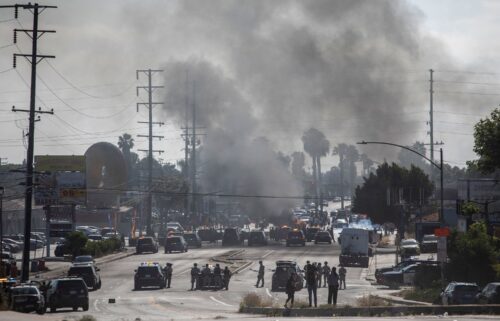Reflecting on the essential role of the news media in 2020, and looking ahead to 2021
A version of this article first appeared in the “Reliable Sources” newsletter. You can sign up for free right here.
The year 2021 is about to start with a bang. We have compiled a list of fourteen media world stories to watch in the months ahead. But up first, a review of 2020:
The stress test
The pandemic was a top-to-bottom stress test for the media sector, from newsrooms to movie theater chains to indie bookstores. No corner of the media world was unscathed. There were massive shifts to work-from-home production; mass layoffs at some companies; and massive changes in consumer behavior. No wonder we were all “doomscrolling.”
Reflecting on the year, I thought back to a confrontation in NYC in early June, at the height of the Black Lives Matter protests, when scores of journalists across the country were “assaulted, arrested or otherwise prevented from documenting history in unprecedented numbers.”
A curfew was in effect in the city — but journalists were exempt so that they could cover the news. Robert Bumsted and Maye-E Wong of The AP were encircled by police officers who wanted them to leave a public street. One of the officers repeatedly yelled at them: “Who are you essential to?”
When video of the incident was published, a spokeswoman for The AP answered the officer’s question: “The role of journalists is to report the news on behalf of the public. It is unacceptable and deeply troubling when journalists are harassed simply for doing their job.”
Journalism is a messy business. For every prize-winning story there’s plenty of gossip and garbage. Some journalists are schmucks, in it for themselves, willing to cut corners. But in my experience the vast majority of journalists are trying to contribute to their communities, honestly and reliably. The vast majority wouldn’t put themselves in the same category as doctors, nurses or police officers. But they are essential because they tell everyone else’s stories. In 2020 they supplied life-saving information about the coronavirus pandemic.
The stories of 2020 will be remembered for generations. What CBS News president Susan Zirinsky wrote to her staffers about the year applies to many other journalists, as well: “Many people can report for an entire career and never be tested the way you have. You have been tested and succeeded.” A stress test, indeed…
Snapshots of 2020
Here is a very incomplete summary of some of the changes in the wide world of media:
Bob Iger handed the reins to Bob Chapek. NBC launched Peacock. WarnerMedia launched HBO Max. Discovery announced Discovery+. TikTok houses flourished. Clubhouse got people talking. Substack got some people paid. Quibi lifted off, crashed, and burned. Univision changed hands. There was exec turnover everywhere. Jeff Shell took over NBCU. Jason Kilar took over WarnerMedia. Ted Sarandos became co-CEO at Netflix. BuzzFeed bought HuffPost. AT&T sold Crunchyroll and explored options for DirecTV. Spotify picked up The Ringer and Joe Rogan. Amazon acquired Wondery. The NYT acquired the podcast production company behind “Serial.”
Pause. Deep breath. There’s so much more. “Layoff season” in the news biz lasted almost all year long due to the pandemic. Some newspapers gave up their physical office space altogether. Big papers posted impressive digital subscription growth. TV news networks registered record ratings. Many people flocked to legacy brands for life-and-death info. At the same time, a parallel universe of pro-Trump outlets also proliferated. The QAnon cult gained strength. Facebook, Twitter and YouTube cracked down. Trump feuded with Fox and promoted alternatives like Newsmax and OAN. He told people not to believe their eyes or ears. At the end of the year, he practically stopped speaking to the press. Biden filled the void. He out-rated Trump. The political best-sellers were Mary Trump, John Bolton, Bob Woodward, and Barack Obama.
Another pause. Let’s keep going. A racial reckoning in newsrooms led to leadership changes at R29, Bon Appetit, and the Philadelphia Inquirer, among other outlets. Norm Pearlstine stepped aside at the LAT. Ben Smith joined the NYT. Andy Lack left NBC and Cesar Conde took his place. Joy Reid replaced Chris Matthews on MSNBC. Shep Smith joined CNBC. Kara Swisher and Ezra Klein both left Vox for the NYT. Jonathan Karp became CEO of Simon & Schuster in the wake of Carolyn Reidy’s death. ViacomCBS sold S&S to Penguin Random House. Rush Limbaugh confronted cancer and shared his journey on the air. Steve Scully was suspended from C-SPAN. Ed Henry was fired from Fox News. Jeffrey Toobin was fired from The New Yorker. Rashida Jones was named the next president of MSNBC. Anna Wintour was promoted again.
“How press freedom came under attack in 2020”
“New restrictions on press freedoms — many of them imposed in connection with the ongoing COVID-19 pandemic — made it ever harder for journalists to independently report the news,” Meera Selva wrote in a year-end piece for Foreign Policy. Make time for her full report here…
“The four biggest ways 2020 transformed media”
“Something significant shifted in media this year — and it’s not just about the pandemic keeping us inside, glued to screens. It’s all due to a simple idea: cater to the will of the consumer,” NPR’s Eric Deggans wrote this week. Here are his top four takeaways:
— “Broadcast TV and movie theaters face serious threats.”
— “News media struggled to convince half of America to accept basic facts.”
— “The reckoning over civil rights and racial diversity transformed entertainment TV and journalism.”
— “The line between theatrical films and TV vanished as the next phase of the streaming wars begins.”
More ways to remember 2020
— “The great national story of 2020, wherever one lives, was the collision of myth and realty,” John F. Harris writes for Politico.
— Check out the year’s news cycles through the Google Trends lens, via Axios.
— Remember Megxit, “Parasite,” Michael Bloomberg’s campaign? Mashable has a list of “58 things you probably forgot happened in 2020.”
— The subjects of BuzzFeed’s most-viewed news stories of the year: Meghan Markle, Billie Eilish, Black protesters, and more.
— Politico’s Zack Stanton recounts the “worst predictions of 2020.”
— Film critics A.O. Scott and Manohla Dargis write: “This Year Was a Disaster. We Hope the Sequel Is Better.“
— The Washington Post editorial board came up with 20 GOOD things that happened in 2020!
— And historians are here to remind us that 2020 was not even close to being the worst year ever. So, there’s that…
2021 is starting with a bang
Sunday, January 3, 2021 is the convening of the new Congress, including a vote for House speaker, which might require a “high-wire act” by Nancy Pelosi. Monday is “back to school, back to work” day, to the extent that people physically travel to work and school these days. Tuesday is the all-important Senate election in Georgia, which will receive wall-to-wall coverage on cable news. Wednesday is the Senate’s certification of the electoral vote, which normally wouldn’t receive much attention at all, but will be a big news event since Josh Hawley is objecting to the results. And that’s all in the first six days of the new year…
Fourteen media world stories to watch in 2021
With contributions from Kerry Flynn, An Phung and Brian Lowry:
— Will all the huffing and puffing over Section 230 amount to anything?
— How many digital media companies will be rolled up and in which combinations?
— What form will Trump’s post-presidency take? Will he try to compete with Fox, and if so, how?
— Will news ratings fall as Trump has predicted, or will perpetual partisan warfare and news about a new administration sustain them?
— What will be the impact of lawsuits by voting tech companies and individuals that were smeared by pro-Trump outlets?
— How will tech platforms respond to mutations of disinformation?
— Will a series of retirements spark leadership changes in major newsrooms?
— What will newsrooms look like as vaccinated workers return to them?
— How will newsroom leaders follow through on their commitments to diversity and inclusion?
— What newsrooms will unionize in 2021?
— What are the next steps in the growing biz of newsletters? Which alternatives to Substack will flourish?
— How will the Warner Bros. rollout of movies in theaters and on HBO Max impact Hollywood?
— Will a delayed calendar salvage an upended awards season, where people will be even less familiar with the nominees than usual?
— When will people be able to attend in-person entertainment, including live theaters and theme parks, in bigger numbers? Will there be pent-up demand after a year of couch-potato consumption?
A double feature on the Reliable Sources podcast
On the first of our two end-of-the-year podcast episodes, Oliver Darcy, Kerry Flynn, Chloe Melas, Frank Pallotta, and Donie O’Sullivan revisited the biggest stories of 2020, from Disney+ to disinformation. On the second episode, the crew looked ahead to all things 2021. Listen to the podcast via Apple, Spotify, Stitcher, TuneIn, or your favorite app…
For more media world news, subscribe to our nightly newsletter right here…



